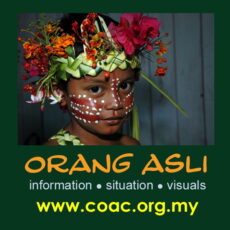All eyes on Orang Asli support
2010/10/26 By Nik Imran Abdullah and Aidi Amin
New Straits Times 26.10.2010
GUA MUSANG: The living conditions of the Orang Asli here have improved over the years but many of them feel that more can be done to safeguard their interests.
They have also developed strong opinions on various issues, particularly those that directly affect them, and are beginning to understand that their rights are not adequately protected.
Chief among their concerns is the right to own the land they have lived on for generations.
Kampung Sangwai village federal development and security committee chairman Rashid Angah said his fellow tribesmen were now raising questions on the issue of land rights.
He said some of them have got in touch with those in authority to obtain land titles.
“But, our efforts to get the title for our land seem to get nowhere.”
Most times, he said those in power who offered to help Orang Asli were only gave empty promises especially during the election period.
“They come to our villages with promises but when the election is over, our land issue is forgotten.”
Kampung Sangwai is one of the few Orang Asli villages in the Pos Brooke/Lojing voting centre under the Galas state constituency.
Apart from Pos Brooke/Lojing, there are five other voting centres where Orang Asli form the majority population in Sungai Ber, Belatim, Balar, Bihar and Pos Hau, all under the Galas seat.
Altogether, there are 1,889 Orang Asli registered voters in the six settlements with the majority of them from the Temiar tribe.
The minority tribes include Batik and Manduk.
Alang Harun, 42, said he had lost 77 durian trees when his orchard in the Lojing highlands was bought over by a company to start large-scale vegetable farming.
He said Orang Asli had now been left with limited areas to grow their own food as more companies moved into their area in the Pos Brooke/Lojing to open vegetable farms.
Alang, who is an odd-job worker, said he was also concerned about his children’s future if the land title for the plot of his home was not resolved by the state government.
“I remember signing papers on land matters in the past but have not heard anything from them after that.”
The agriculture companies were not interested to hire Orang Asli to work at their farms as they had asked for a reasonable salary scheme.
“We may not be educated but we know the salaries they offer are too low. When we turn down the job offers, they call us a lazy lot.
“Now, all you see working at their farms are foreign workers who will accept any amount as salary.”
A recent trip to the area revealed that forests at hilltops in the Lojing highlands had been cleared for vegetable farming.
Pos Bihai tok batin (village head) Awin Pedik said life had forced the Temiar to take their own measures to safeguard their well-being.
He said the situation had been unsettling for the Orang Asli, who live 40km from Kuala Betis, here, after more trespassers had come to their village since last year.
“We have chased out illegal miners, potential thieves and a developer who claimed that he had bought our land from the state government.
“Our main concern is the women and children who cannot fend off these gangsters when our men go hunting. At night, the men would have to take turns patrolling the area,” Awin told the New Straits Times.
Awin, who has been the village head for the last 10 years, claimed that developers had tried to seize land from other Orang Asli settlers in Balar and Belatim.
“This happens when you have a village that is exposed. We have equal rights on our land as well but most people seem to ignore this. If the state had helped create a guarded entrance and set up a log book to record visitors entering the area, this would filter out trespassers.”
He added that he was equally concerned about protecting the Orang Asli heritage especially when there were only 400 of them in his village.
With the Galas by-election nearing on Nov 4, Orang Asli settlements have become favourite spots for visiting political leaders to hold events to plead for their support.
A recent visit to Pos Hau and other Orang Asli villages showed that most of the Orang Asli settlements have been adorned with party flags and symbols.

